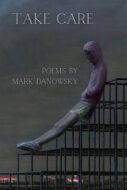 Mark Danowsky
Mark Danowsky
Take Care
Moon Tide Press
Reviewer: Brian Fanelli
Mark Danowsky’s latest collection of poems, Take Care, offers insightful observations within tight, economical lines. Many of the individual poems feel like bursts of thought and epiphanies. The work proves that the poet has a keen eye for natural surroundings and the ability to use everyday imagery to push towards deeper truths and meditations on everything from personal relationships to poignant self-reflections.
Many of the poems can be read in one breath and have haiku-like structure. In just a few lines, they offer concrete thoughts, often rooted in imagery that we perhaps take for granted as we encounter it daily. For instance, in the three-line poem “Linger,” Danowsky writes:
that scent
on your hands after
arranging tomatoes
“Linger” is a good example of what’s at play in much of the collection. The poet has a knack for distilling a single image in the brevity of his verse. The poem is reminiscent of Ezra Pound’s well-known and anthologized “In a Sation at the Metro,” which, like “Linger,” presents the reader with a single image. In the case of Pound’s two-line poem, he compares faces of subway patrons to “Petals on a wet, black bough.” It’s a great example of a poetic leap of imagination. In the case of “Linger,” the turn comes in the last line, when the reader is presented with a distinct, potent image, that scent of tomatoes that, as the title says, lingers after gardening. Both Pound’s poem and Danowsky’s piece are good examples to present to an Intro to Creative Writing class to discuss specific imagery and sensory detail within poetry.
There’s also a loose thread that runs throughout at least some of the collection pertaining to relationships. The book’s title makes one think of a failed relationship, or simply people moving on, headed down different paths. The title reflects the very notion of goodbye. This idea recurs in a few of the book’s strongest pieces. For instance, in “Lesson,” Danowsky writes, “You taught me / when you neglect them / plants thrive / How different we are.” In just four lines, the poem takes a drastic shift in its concluding line, which is preceded by white space. It’s at that point that there’s a clear break in the relationship, though I do wish this specific relationship, as well as a few of the others addressed in the collection, were fleshed out a bit more. Still, and once again, Danowsky offers the reader a rather complete thought. The last line feels so final.
Meanwhile, in other poems, the speaker clings to a disintegrating relationship, maybe hoping that something, anything, can be salvaged. This is depicted well in “Tiny Resistance,” which reads:
I do not go
when asked to go
I spin the wheels
my thoughts, my silences
There is great loneliness
in ambiguous loss.
Here, as with many of the poems, we mostly have a bare-bones narrative. I read it as referring to the end of a relationship, but the poem remains ambiguous enough for multiple interpretations. Still, that idea of trying to stay around when something has reached its end point is relatable. Though Danowsky doesn’t give us a full-blown narrative here, the piece still offers enough meat for the reader to ponder and chew on. That’s what works well throughout Take Care. These poems are thoughtful insights that deserve contemplation, even after reading through the collection a few times.
Though Take Care has plenty of poems that ruminate on failed relationships and the speaker’s self-doubt, there are other pieces that make a nice contrast to “Tiny Resistance” and “Lesson.” As an example, “Nudges” feels like a poem that would be written as a love note, something to offer a partner before they go to work. On the page, it even looks like that, with only one-two words per line and only eight lines total and the simple statement that the speaker wants to make someone’s day better. Again, the actual person addressed is unknown and the statement may be a simple declaration, but it works in the context of the collection and as a counterweight to some of the other pieces.
Much later in the collection, Danowsky explores themes of Taoism, while linking a deeper, philosophical concept to the everyday and colloquial. This is especially true of the poem “Average,” which reads:
Toa considers me average
from what I gather-
because I doubt.
This is fine by me
knowing what I know
about genius. I’m afraid
of what it would feel like to be one.
I rub my index finger over the edge
of my thumbnail – a habit I picked up
from watching a lowland gorilla at the zoo
who died on the operating table last year.
I miss that gorilla every time
I make this gesture. An average gesture
I am thankful for.
What works especially well about this poem is the leaps and turns it takes, as well as the fact that Danowsky gives it room to breathe. He starts with a heady concept, specifically Taoism, self-doubt, and even the notion of genius, before drilling down to more familiar, less abstract imagery, including the index finger over the thumb and the gorilla in the zoo. Yet, by the end of the poem, the piece moves from the speaker’s self-doubt to his self-acceptance. It’s a well-crafted and finessed work and one of the highlights of the collection.
Despite the brevity of Danowsky’s poems and Take Care as a whole, this collection and the works within linger. The poet offers some valuable insights and isn’t afraid to self-critique, while never wallowing. The poet has a keen eye for the world around him, while the collection’s strongest pieces explore and push towards deeper and moving truths.

